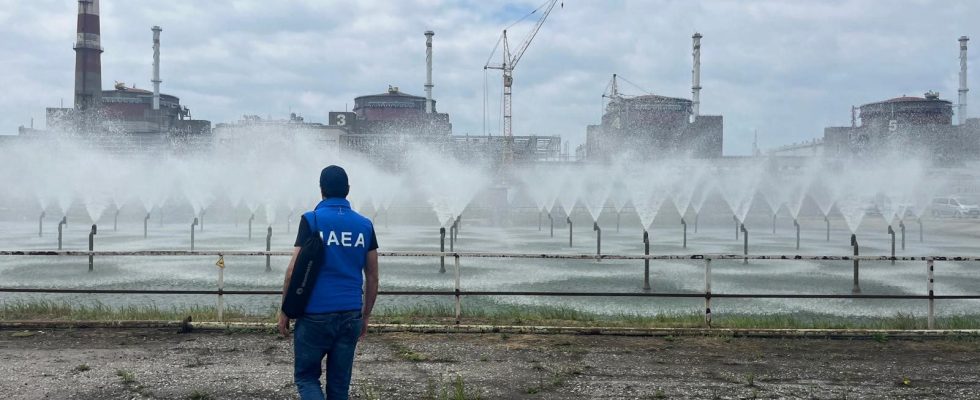European leaders, meeting Thursday March 21 in Brussels, timidly progressed on the path of increased military aid to Ukraine, after a new call for help from its president, and in the face of a Russian threat considered increasingly more worrying. Among the proposals on the table, the use of profits from frozen Russian assets to finance Ukrainian armaments and European bank loans to encourage the production of military equipment.
Information to remember
⇒ German
⇒ “Eurobonds” for investment in defense companies.
⇒ Von der Leyen proposes to tax Russian grain imports into Europe.
Power line supplying Zaporizhzhia cut by bombing
One of the two power lines supplying the Ukrainian nuclear power plant in Zaporizhia was cut by a bombing, announced Friday the Ukrainian Minister of Energy, German Galushchenko, who denounced a large-scale Russian attack against Ukrainian infrastructure.
“The enemy is currently carrying out the biggest attack on the Ukrainian energy industry in recent times,” German Galushchenko said on Facebook. “Due to bombing, one of the power transmission lines supplying the Zaporizhia nuclear power plant was cut,” he added. The Ukrainian operator Energoatom confirmed that after this outage, the plant was only connected to Ukraine’s electricity network by a single line, recently repaired by Ukrainian technicians after having also been out of service for a long time due to of another bombardment.
Frozen Russian assets will finance Ukrainian arms
European leaders, meeting in Brussels on Thursday, decided on Thursday to “move forward” with a plan to use profits from Russia’s frozen assets in the EU to arm Ukraine. The interest on these assets represents between 2.5 and 3 billion euros per year, according to the head of European diplomacy Josep Borrell.
“We are determined to act very quickly in order to be able to use part of this money to support Ukraine,” said the President of the European Council, Charles Michel, at a press conference on Thursday evening. It is “crucial” that the European Union provides more ammunition to the Ukrainian forces, Ukrainian President Volodymyr Zelensky also addressed the leaders of the Twenty-Seven, whom he joined by videoconference.
The Europeans are looking for ways to strengthen the Ukrainian arsenal, as well as their own defense industry, at a time when American aid of more than 60 billion dollars is still blocked in Congress in Washington. For its part, Russia on Wednesday threatened the European Union with legal action “for decades”, denouncing an initiative which amounts to “banditry” and “theft”.
Expand loans to defense companies
In addition to seizing income from frozen Russian assets, other “innovative” forms of financing are being studied. The 27 thus asked the European Investment Bank (EIB), the EU’s financing body, to expand its loans to defense companies.
France and other countries such as Estonia are in favor of launching a large European loan in order to respond, as was the case during the Covid pandemic, to the “existential” threat weighing on Europe. “There are several possible avenues to explore”, including a European loan, said the French, Estonian, Lithuanian, Latvian, Portuguese and Romanian foreign ministers in a joint letter.
But several countries, including Germany, the Netherlands and Sweden, are opposed to it, and the Twenty-Seven only committed Thursday to examining “all options” in terms of financing. “I am not convinced that ‘Eurobonds’ (European loans) are the solution to everything,” declared the Belgian Prime Minister, in unison with other very reluctant countries.
Taxes on Russian grain imports
The President of the European Commission Ursula von der Leyen also proposed Thursday to impose customs duties on cereals coming from Russia, although they are currently exempt, to the great dismay of EU farmers.
“We have prepared a proposal to increase customs duties on imports of Russian and Belarusian cereals, oilseeds and derived products. This will prevent Russian cereals from destabilizing the European market for these products,” said Ursula Von der Leyen. This measure will deprive Russia of revenues from these exports and “will ensure that illegal exports of Ukrainian grain stolen by Russia do not enter the EU market”, stressed the Commission President.
IMF approves $800 million in aid
These $880 million, announced in a press release, correspond to the third tranche of an aid plan of $15.6 billion adopted in March 2023. An IMF team held discussions in Warsaw in mid-February with Ukrainian officials and measured the country’s achievements against the objectives that were set a year ago, when this aid granted under the Extended Credit Facility (EMDC) was adopted and which spread over four years.
She estimated the country’s reconstruction needs at $486 billion. Welcoming the resilience of the Ukrainian economy in 2023, IMF Managing Director Kristalina Georgieva warned that “the recovery (of the country) should slow down” this year, due in particular to “delays in external financing”. By far the first military support for Ukraine, the United States has not sent a large envelope to kyiv since December 2022.
